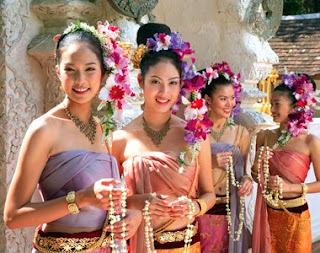
King Mengrai founded the city of Chiang Mai (meaning "new city") in 1296, and it succeeded Chiang Rai as capital of the Lanna kingdom. To protect it against raids from Burma, the city was surrounded by a moat and a defensive wall. With the decline in power of the Lannathai kingdom, the city lost importance and often was occupied by either the Burmese or Thais from Ayutthaya. As a result of the Burmese wars that ended with the fall of Ayutthaya in April 1767, Chiang Mai was so depopulated that its remaining inhabitants abandoned the city from 1776 to 1791. During that time, Lampang functioned as the capital of what remained of Lannathai.
Chiang Mai's historical centre is the walled city (chiang in Thai, hence Chiang Mai - "New Walled City"). Sections of the wall remain at the gates and corners, but of the rest only the moat remains. As of March 2008 the moat has been drained and repairs are underway.
Inside Chiang Mai's remaining city walls are more than 30 temples dating back to the founding of the principality, in a combination of Burmese, Sri Lankan and Lanna Thai styles, decorated with beautiful wood carvings, Naga staircases, leonine and angelic guardians, gilded umbrellas and pagodas laced with gold filigree. The most famous is Doi Suthep, which overlooks the city from a mountainside 13 km away.
Chiang Mai formally became part of Siam in 1774, when the Thai King Taksin captured it from the Burmese. Chiang Mai rose in both cultural, trading and economic terms to adopt its current status as the unofficial capital of the north of Thailand, second only in national importance to Bangkok.
Modern-day Chiang Mai has expanded in all directions, but particularly to the east towards the Ping River (Mae Nam Ping), where Thanon Chang Klan, the famous Night Bazaar and the bulk of Chiang Mai's hotels and guesthouses are located. The locals say you've not experienced Chiang Mai until you've seen the view from Doi Suthep, eaten a bowl of kao soi, and purchased an umbrella from Bo Sang. Ratchadamneon Rd, the main walking street from Thapae Gate to the very popular Wat* Phra Singh, is fast becoming the place to go in the evening if you want somewhere a little more relaxed.


No comments:
Post a Comment